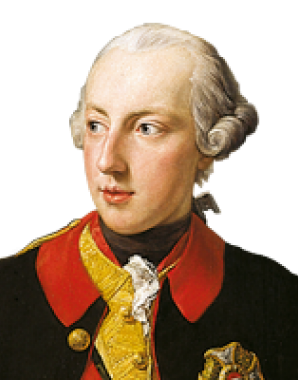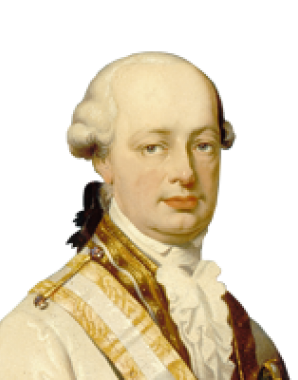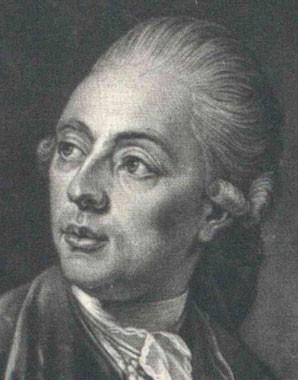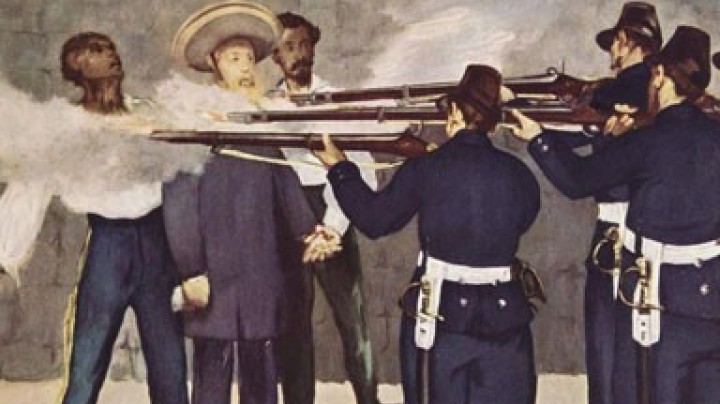Against the ‘Jacobin conspiracy’
Franz II (I) reacted to oppositional activities with police and a network of informers. Some alleged conspirators paid for their activities with their life.
Two verses from Franz Hebenstreit’s ‘Eipeldauer Song’ of 1793, calling for the execution of Emperor FranzS'ist ja das Volk kein Arschpapier
Und darf auf sich wohl denken,
Wer halt nicht lernen will Manier,
Den Lümmel muss man henken.Drum fort mit ihm zur Guillotin
Denn Blut für Blut muss fließen
Hätt man nur a hier so an maschin,
Müsst's mancher Großkopf büßen.[The populace is not just arse-paper and is surely allowed to think for itself; the one who is just not willing to learn manners is a lout and deserves to be hanged. So off with him to the guillotine, for blood must be repaid with blood; if we had a machine like that here, then many a nob would have to pay for his deeds.]
Although the young Emperor Franz suppressed the reform-oriented circles encouraged by his predecessors and banned publications containing revolutionary thinking, he could not prevent the formation of certain small oppositional groupings, composed particularly of individuals who had formerly worked under Leopold II, together with Freemasons, civil servants, middle-class intellectuals and students. Franz rejected the proposal made by Joseph von Sonnenfels for a written guarantee of fundamental rights, had those who had made themselves unpopular in his eyes arrested and imprisoned, and introduced the systematic use of informants to spy upon fellow citizens.
For Franz, ‘Josephists’ (supporters of the ideas of Joseph II) and ‘democrats’ alike were guilty of ‘Jacobinism’. This vague term of abuse was used as a blanket term for all proponents of oppositional thought, even though the Jacobins were in fact the most radical party of the French Revolution. The most prominent figures in this field were Baron Andreas Riedel, formerly tutor to the sons of Leopold II, the army lieutenant Franz Hebenstreit von Streitenfeld from Prague (famous for his revolutionary ‘Eipeldauer Song’) and the poet and Freemason Aloys Blumauer, the middle classes being furthermore represented by such figures as doctors, the lottery owner Johann Hackel and in Hungary Ignaz von Martinovics.
The summer of 1794 saw the populace suffering from waves of price increases and a general war-weariness and consequently showing increasing dissatisfaction with those in power. Riedel was pleading in favour of action. Franz Hebenstreit had developed a somewhat absurd-looking instrument of war, a sort of scythed chariot which he intended for use against cavalry in France. In July 1794 all the members of Riedel’s group were arrested after these plans had been betrayed to the police by an informant, the bookseller Joseph Vinzenz Degen. Among the many offences with which they were charged were the preparation of an uprising, supplying arms to France, and the propagation of subversive literature, pamphlets, satirical writings and songs. Although there was no concrete evidence of a revolution in the offing, the combination of the use of informants with the implementation of state power led to a series of arrests. In 1795 the punishments were carried out: nine executions and a large number of lengthy prison sentences. Hebenstreit’s execution on 8 January 1795 in front of the Schottentor, one of Vienna’s city gates, is said to have been witnessed by 90,000 spectators.



















